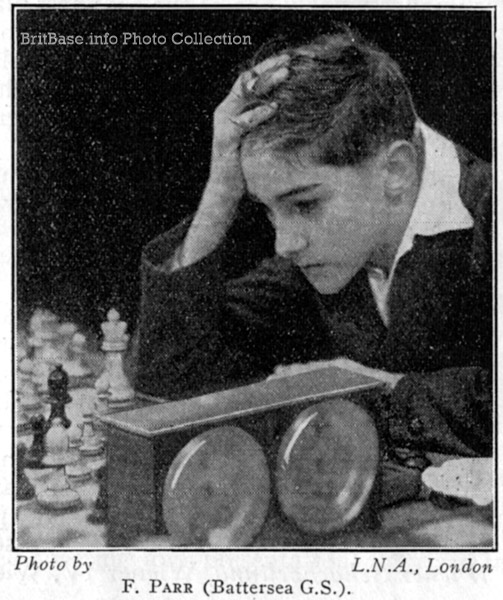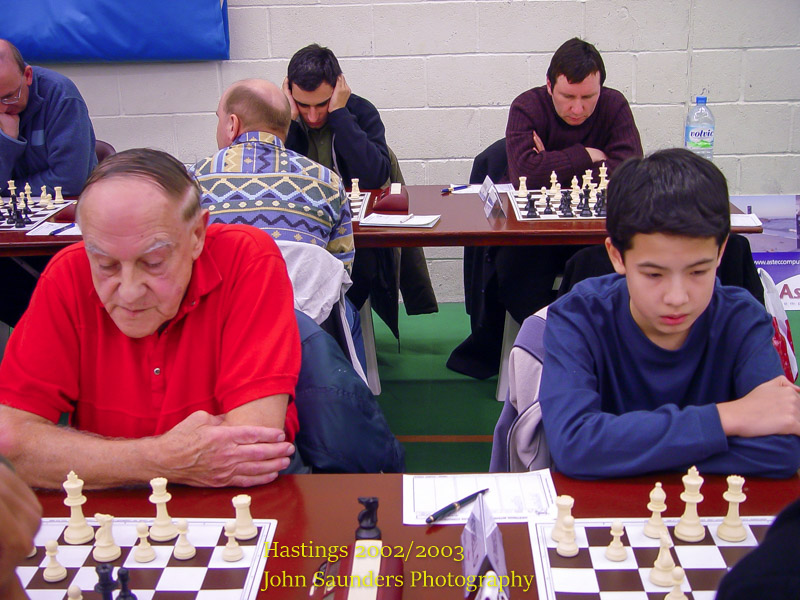BritBase.Info - British Chess Game Archive
Obituary: Frank Parr (17 December 1918 - 28 December 2003) • Frank Parr games collection
Originally written and posted in 2003, revised in 2021: last edited: Friday December 22, 2023 2:13 PM
John Saunders reports: Frank Parr, well-known and popular English chess player, and one-time Hastings Premier winner, died on 28 December 2003 (the opening day of the Hastings Congress) in Epsom Hospital after a long illness. He was 85. He was a great character and a true friend to British chess, and he will be greatly missed.
 Frank
Parr was a strong and experienced player of both over-the-board and correspondence
chess, and enjoyed one of the longest chess-playing careers on record.
Born in Wandsworth, London, he attended Battersea Grammar School and was
a keen player in his schooldays. BCM recorded
him playing at the London Boys' Championship of January 1933 and published
one of his games for the first time in that year. In April 1933 he lost
a game he might have won in the British Boys' Championship, which would
have put him through to the four-player final and eliminated the eventual
winner. In 1934 he was defeated in a play-off for the British Boys' Championship
by David Rabinovich (later Raeburn) but Parr took the title in 1935 as
well as the London Boys' Championship for 1934/5. He capped a fine year
by winning the 1935 Surrey Championship. This was to be the first of many
county titles: he won it outright a further eight times over the following
30 years, as well as sharing it with Ray Keene in 1967.
Frank
Parr was a strong and experienced player of both over-the-board and correspondence
chess, and enjoyed one of the longest chess-playing careers on record.
Born in Wandsworth, London, he attended Battersea Grammar School and was
a keen player in his schooldays. BCM recorded
him playing at the London Boys' Championship of January 1933 and published
one of his games for the first time in that year. In April 1933 he lost
a game he might have won in the British Boys' Championship, which would
have put him through to the four-player final and eliminated the eventual
winner. In 1934 he was defeated in a play-off for the British Boys' Championship
by David Rabinovich (later Raeburn) but Parr took the title in 1935 as
well as the London Boys' Championship for 1934/5. He capped a fine year
by winning the 1935 Surrey Championship. This was to be the first of many
county titles: he won it outright a further eight times over the following
30 years, as well as sharing it with Ray Keene in 1967.
In 1936 Frank Parr made his debut in the British Championship in Bournemouth. He finished 5th with 6/11, including a win against Sir George Thomas, and this started his long and remarkable participation in this particular event. After missing a few championships in the 1940s and early 1950s, he played again in 1955 (when he scored 7½ including wins against Wade and Penrose), but it was in 1956 that he came closest to winning the British Championship. After scoring only ½/2 at the start, Parr reeled off a Hodgson-like streak of eight straight wins and drew with Leonard Barden (after missing wins) in the last round. His score of 9/11 would have been enough to take the title in most years but in 1956 it was only enough for second place because Hugh Alexander (Parr's victim in round eight) scored 9½/11. He also made a good score in 1969 (7/11) and competed in 25 British Championships between 1936 and 1991. Though his overall game score in the competition was minus six, there can be few players to rival his points tally - 134½/275.
In 1937 Parr was travelling reserve for the England team which met the Netherlands in Amsterdam. He did not get a game on that occasion but called to the colours in 1939 when he scored 1½/2 on board nine. As a player Frank Parr was aggressive and resourceful, with a strong tactical eye. As so typical of his generation, he was less at home in the opening. He had a quiet disposition and impeccable board manners, sitting like a statue at the board but with the merest hint of a smile if you caught his eye away from it.
In 1938 he won a notable game against GSA Wheatcroft in the City of London Chess Club Championship, which has since been published in many magazines and anthologies. He had a key position from this game made into an elegant tapestry which he hung on the wall in his living room at home.
Parr,F - Wheatcroft,G
City of London Club Championship, 1938
1 d4 Nf6 2 c4 g6 3 g3 Bg7 4 Bg2 d5 5 cxd5 Nxd5 6 Nc3 Nxc3 7 bxc3 c5 8
e3 0-0 9 Ne2 Nc6 10 0-0 cxd4 11 cxd4 e5 12 d5 Ne7 13 Ba3 Re8 14 Nc3 Qa5
15 Qb3 (Threatening Ne4) 15...e4 16 Nxe4! Nxd5 [If 16 ..Bxa1
17 Rxa1 and Nd6 or Nf6+ cannot be stopped] 17 Rac1 Be6 18 Rc5 Qb6
[Not 18...Qd8 19 Rd1] 19 Rb5 Qa6 [19...Nxe3 20 Qb4 Nc2 21 Rxb6
axb6 22 Qxb6 Rxa3 23 Nd6±] 20 Nc5 Nxe3 21 Nxe6 Nxf1 22 Ng5!
Nd2 (Forced - Parr) 23 Qxf7+ Kh8 24 Bd5! h6 [24...Re1+ 25 Kg2+-; If
24...Qf6 25 Qxf6 Bxf6 26 Rxb7 Bg7 27 Bb2 etc] 25 Bb2! Rg8 26 Qd7! Qa4
27 Bb3! Nxb3 [27 ..Qa6 then the only move 28 Qh3! h5 (28...Nf3+ 29
Nxf3 g5 30 Be6!+-) 29 Qxh5+!! (29 Nf7+ is the same) 29...gxh5 30 Nf7+
Kh7 31 Bc2+ Ne4 32 Bxe4+ Qg6 33 Rxh5+ Bh6 34 Rxh6#] 28 Nf7+ Kh7 29
Rh5!! Qa5 30 Rxh6+! 1-0

Frank Parr at his last Hastings Congress in 2002/3, alongside future GM David Howell
One singular achievement of Frank Parr's was that, on his only appearance in the Hastings Premier, he won the tournament. This was in 1939/40 when he was already in uniform, having been called up with all those other young men unlucky enough to have been 21 in 1939. The Premier's line-up was depleted that year because the war had started, but it was no mean achievement to score 6/7 ahead of the likes of W. Ritson Morry and Harry Golombek. Frank played many more times in the Hastings Challengers right up to 2002/3 when I took this photo of him sitting alongside David Howell. He was also a regular competitor in the Paignton and Surrey Easter Congresses (although he usually took a half-point bye on the Saturday afternoon round of the latter - to go and watch Fulham play soccer).
After the war, work and family responsibilities took up more of his time and he did not have the opportunity to build on his youthful promise at over-the-board chess. But he took up correspondence chess and was successful, tying for the British Correspondence Championship with Gabriel Wood in 1948, and Harold Israel in 1949, and going on to win it outright in 1950 and 1956. It is strange to reflect, in this age of rating inflation and master titles for all and sundry, that Frank Parr never held a FIDE title of any description, or even one of the discontinued (but prestigious) BCF (British Chess Federation) titles of a few years ago.
Frank Parr worked as a messenger at the London Stock Exchange until his retirement many years ago. He played for the Stock Exchange Chess Club in the London League, and Sutton Chess Club in the Surrey League. He had served as an adjudicator for the Surrey League from before WW2 until his death; such was the quality of his work that there had never been a successful appeal against one of his verdicts in all that time. He was the father of three sons and one daughter. His eldest son David Parr (1944-2003) was a master-strength player who predeceased his father in 2003. Another son, Peter Parr (1946-2013), was also a very strong player who emigrated to Australia and was well known in chess circles there.
Frank Parr - An Appreciation by Michael Franklin (BCM, February 2004, p83)
I first met Frank in my middle teens when playing in the Surrey summer chess events. Following on were the British Championship Qualifying events and the National Chess Centre Championships. From memory in a four-year period Frank won the Surrey Championship twice (I just managed the other two). It usually had most of the top London players at the time.
I was partly responsible for Frank not winning the Blackpool British Championship in 1956. In the last round I was playing Alexander and for some strange reason he offered me a draw but I declined and eventually lost. At the time Frank stood a little better against Leonard Barden and his possible disappointment at my action may have resulted in him only drawing. I’m very happy to report that this has never spoilt our 57 years friendship.
Frank’s first love was his garden, which was very large and in which he also kept bees. I will miss his home-made jams and honey. His second love was cricket at The Oval, and when I retired I joined him to watch the ups and downs of Surrey. His
knowledge of the game and players going back over 60 years made for many enjoyable days. Having lived in Fulham as a boy he was faithful to the Football Club. However, I did not join him at Craven Cottage as my allegiance was elsewhere.
Frank was strong both physically and mentally; for his wife to die at the time of his retirement was the cruellest of fates, as was the loss of his eldest son David last year. However, I never heard him bemoan his lot whatever he may have felt inside.
Returning to Frank’s youth, he was such a promising prospect that Sir George Thomas took him under his wing and got him into tournaments that were not open to many. Also, his job on the Stock Exchange was a result of his chess ability; they wanted him for his chess!
Along with many others the 1939-45 war took quite a chunk out of his personal and chess life. Being in the Territorial Army he was in from the beginning. Although he would never have considered a professional chess career had the option been available at the time, he may well have gone much higher in chess had it not been for the advent of 1939-45. He will be missed.
© 2003, 2021 John Saunders, text and photos.
